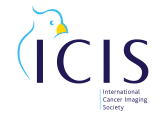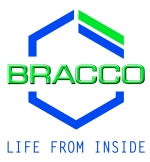Events / Education
International Cancer Imaging Society Meeting and 16th Annual Teaching Course
Mon 03 Oct 2016 Wed 05 Oct 2016 Society
Relevant Documents
ICIS 2016 Full ProgrammeThe 16th annual course of our Society will focus on practically orientated education of cancer imaging through interactive teaching and the fostering of active learning. State of the art and novel quantitative and functional imaging techniques will be highlighted.
Special plenary sessions give attention to the developing role of radiomics and state-of-the-art quantitative, functional and metabolic imaging techniques, including PET/MR.
Keynote lectures highlight the challenges of assessing response to immunotherapy and the role of international outreach in oncology.
Individual learning is emphasised by small group sessions, interactive workshops and computer based hands-on workshops fostering active participation.
A session entitled cases we would like to read again will present interesting oncologic cases reviewed with the benefit of hindsight.
There will be scientific sessions, dedicated to proffered papers, presenting research in the field of imaging in oncology. There will also be a poster exhibition and the best overall paper and poster will be awarded a cash prize.
This course is designed for all radiologists, nuclear medicine physicians and other specialists interested in the diagnosis and management of oncology.
The meeting will be held in the Technology and Innovation Centre, Glasgow, Scotland.
Glasgow has been named one of the top 20 'Best of the World' destinations for 2016 by National Geographic Traveller, and has been voted the ‘friendliest city in the world’ in a Rough Guides poll. Expect to enjoy the warmest of Scottish welcomes, as well as Mackintosh's magical art nouveau architecture, vibrant nightlife with world-class restaurants, all against the backdrop of Scotland's uniquely rich cultural heritage.
Further afield, ancient castles, picture-postcard distilleries, tranquil lochs, outstanding golf courses and miles of unspoilt coastline are all just a short journey from the city centre.
There will be a complimentary welcome drinks reception hosted by the Lord Provost of Glasgow on Monday 3rd October at the impressive City Chambers.
The course party will be held on Tuesday 4th October at the stunning Trades Hall of Glasgow, located in the city centre, just a short walk from the Technology and Innovation Centre.
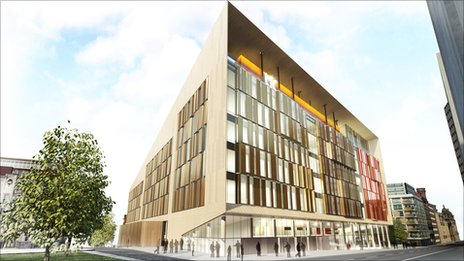
Course Highlights
5 Plenary sessions
• Cancer Imaging: More Than Meets the Eye
• The Role of Interventional Radiology in Oncology
• Implementing PET/MR in Clinical Practice
• Lifelong Learning in Oncologic Imaging
• Structured Reporting
2 Keynote lectures
• Immunotherapy: Imaging Challenges
• Towards the Cure of all Children with Cancer: Global Initiatives in Paediatric Oncology
12 Interactive workshop sessions
• After Effects of Therapy
• Lung Cancer
• Paediatric Oncological Imaging
• Managing the Patient with Chronic Liver Disease
• Oncology Imaging Basics for the Trainee and Novice
• Lymphoma
• Pancreatic Tumours
• Tumours of the Head, Neck and Brain
• Kidney Cancer
• Cases I Would Like to Read Again
• Mimickers of Malignancy
• Oligometastatic Disease in Prostate Cancer
6 Computer Hands-On Workshops
• Practical Imaging Processing for Cancer Diagnosis
• Uterine Cancer
• Lung Cancer Staging
• Breast Cancer Staging
• Whole Body MRI
• Ovarian Masses: Easy and Difficult Cases
4 Scientific Paper Sessions and Poster Exhibition
A cash prize for the best oral presentation and best poster will be awarded at the course party on Tuesday evening
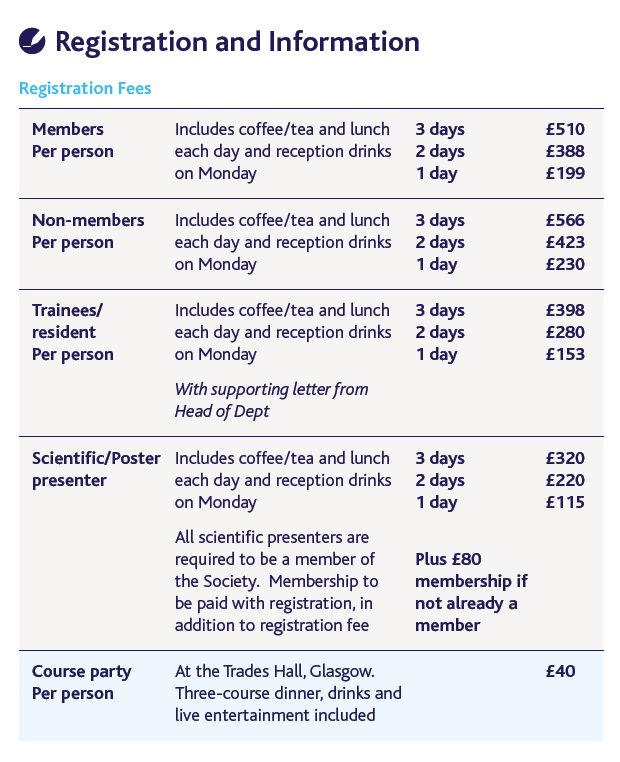
Socials
Welcome Reception
A Welcome Reception will take place on Monday 3rd October at 5:45pm; tickets are included in the registration fee. The drinks reception will be hosted by the Lord Provost of the City in the Glasgow City Chambers. First opened by Queen Victoria in 1888, it boasts the largest marble staircase in western Europe. This is a brilliant opportunity to unwind after the first day, while getting to know your fellow delegates and the ICIS faculty.
Course Party
We hope you will join us on Tuesday 4th October for the opportunity to relax, network and have fun in the stunning Trades Hall. Often referred to as 'Glasgow's best kept secret', the building has a unique history with exceptional features and apart from the medieval cathedral, is the oldest building in Glasgow still used for its original purpose.
Join us from 7.30pm for dinner followed by a traditional Scottish cèilidh lead by a live band. Purchase your ticket while registering for the course on the ICIS website. Each ticket costs £40 which includes a three course dinner, half a bottle of wine and teas and coffees. As well as live entertainment we will have the awarding of cash prizes to our best posters and presenters. We hope to see you there!
Register
At the top of this page there is a green 'Online Registration' button. Please click it and follow the instructions.
IMPORTANT INFORMATION
Reservations will only be confirmed on receipt of the fully completed registration form and full payment. A confirmation letter and further details will be issued on receipt of full payment.
Reservations are subject to availability and will be confirmed within one week from receipt of completed registration form and full payment.
Refunds (minus an administration charge of £70) will only be made if written notification is received by 9th September 2016. Thereafter no refunds will be made.
Accommodation
Delegates are responsible for making their own arrangements for accommodation. Please note Glasgow is a very busy and vibrant city, hotels book up months in advance. We strongly recommend you book early.
Click here to see a link showing the course venue in relation to the various hotel options, click on each pin to see the hotel details including price and booking information
Other good value hotels around the venue:
By Air
Glasgow is served by two airports - Glasgow International (GLA) is the city's principal airport serving the major carriers, whilst Glasgow Prestwick (PIK) is the secondary airport serving low-cost airlines. Both airports are well linked to the city centre via bus or train.
By Train
Glasgow Central is the major mainline station, and is the terminus for all inter-city services between Glasgow and destinations in England. Direct trains from London Euston to Glasgow Central take 4.5 hours. Glasgow Central is on Gordon Street, 13 minutes walk from the Conference Centre 'Technology and Innovation Centre' and under 10 minutes walk from most recommended hotels.

Please have a look at this online guide including hundreds of ideas of what to see and do in Glasgow.
ICIS recommends:
Kelvingrove Art Gallery and Museum
Loch Lomond is just over an hour's drive from the city centre
Glengoyne Distillery. The whisky and chocolate tasting tour is recommended. Discounts are available if you present your ICIS conference badge. We advise you book in advance by phoning 01360 550254 to avoid disappointment.
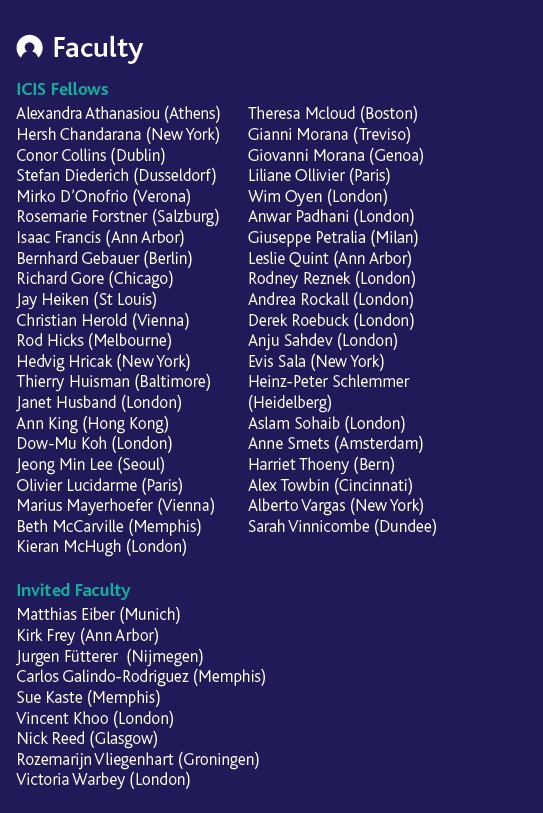
The Royal College of Radiologists has awarded this course 17 points in total:
- Monday - 6 points
- Tuesday - 6 points
- Wednesday - 5 points
The EACCME have awarded this course 17 CME points in total:
- Monday - 6 points
- Tuesday - 6 points
-Wednesday - 6 points
Accreditation has also been sought for CME points from the European Accreditation Council for Continuing Medical Education (EACCME) via the European Board of Radiology.
You will be able to generate your own certificate of attendance once you have completed our daily online feedback form.
Call for papers / posters
Abstracts that do not adhere to the following important points will be rejected:
The title should not exceed 15 words.
The abstract should not exceed 250 words.
Please use authors’ initials and surnames only.
Qualifications should be omitted. Do not include references, tables or figures.
Please do not use block capitals.
Please find examples at the bottom of the page.
You may choose among three different abstract types:
> Oral Scientific Presentation
> Poster Scientific Presentation
> Poster Educational Presentation
Oral Scientific Presentation
The abstract should be separated into “Aim”, “Methods”, “Results” and “Conclusion”. The abstract limit is 250 words. Abstracts should not include promissory notes such as “We will provide additional data during our presentation.” Authors of accepted oral presentations will be invited for a presentation within the Scientific Paper Sessions. Presentation time will be 8 minutes with 2 minutes for Q&A (depending on the final program).
Poster Scientific Presentation
The abstract should be separated into “Aim”, “Methods”, “Results” and “Conclusion”. The abstract limit is 250 words.
Poster Educational Presentation
The abstract should be separated into “Learning Objectives”, “Content Organisation”, and “Conclusion”. The abstract limit is 250 words.
Abstracts selected for presentation will be published in the Proceedings of the 16th International Cancer Imaging, given to all delegates and faculty. A downloadable version of your submission will be made available to our membership on the members only area of our website, and be available on the Cancer Imaging open access website. Authors of selected abstracts will be notified after Monday 13th June 2016.
It will be obligatory for all scientific presenters to be members of ICIS at the time of presentation in Glasgow. The annual membership fee of £80 will be added to the scientific presenters’ fee at registration if current membership is not in place. Membership will run for one year from date of registration; all standard member benefits will apply.
Queries may be addressed to the ICIS Secretariat
Tel: +44 (0)20 7036 8805 or Email: [email protected]
Submission deadline: Monday 23rd May 2016
EXAMPLE - POSTER EDUCATIONAL
Chemotherapy Induced Cardiomyopathy: An Overview, Imaging Features, and Future Prospective
Authors: Divito D., Bondin M., Kirschner S. K., Stojanovska J., Ibrahim E., Frank L.
Learning objectives:
To review the spectrum of imaging findings of chemotherapy- induced cardiomyopathy in correlation with most common cytotoxic drugs and regimens.
Content organisation:
Cardio toxic effect of chemotherapy is a well-recognized problem in cancer patients. Cardio toxicity depends on multiple predisposing factors, specific components of the chemotherapy regimen, length of treatment, and dosage.
We will present the spectrum of most common cardiotoxic chemotherapy agents and their combinations, specific effects on the myocardium, and imaging features of cardiomyopathies induced by chemotherapy.
We will review pathophysiology of chemotherapy induced cardiomyopathy including:
- Dose dependent cardiomyopathy
- Predisposing conditions –diabetes, presence of coronary artery disease, age.
- Potential reversibility
We will discuss imaging characteristics of chemotherapy induced cardiomyopathy
- Imaging modalities ( Echocardiography, Cardiac MR, and MUGA)
- Importance of monitoring cardiac function during and after treatment
- Distribution of late Gadolinium enhancement (LGE)
- Emerging technologies for early diagnosis of cardiomyopathy in cancer patients
Conclusions:
Chemotherapy induced cardiomyopathy is a common problem among cancer patients, increasing long term morbidity and mortality and often leading to disability. Patients receiving chemotherapy treatment, particularly cardio toxic agents, should be routinely assessed for cardiac function to diagnose cardiomyopathy during the early phase of treatment and to prevent development of irreversible heart failure.
EXAMPLE POSTER SCIENTIFIC
The Value of 68Ga-PSMA Enhanced MR-PET in Patients with Biochemical Recurrent Prostate Cancer
Authors: E. Rummeny, K. Holzapel, T. Maurer, G. Weirich, E. Gschwend, M. Eiber
Aim: In patients with prostate Cancer increased levels of PSMA can be measured. Recently a new tracer, 68Ga-PSMA, was developed as a specific marker for hybrid imaging (PET/CT, MR-PET). In this study we evaluated the accuracy of 68Ga-PSMA in patients with rising PSA after radical prosatectomy, so called „biochemical recurrent prostate cancer“ (BRPC).
Materials and Methods: A total of 322 patients with BRPC underwent a MR-PET examination (Siemens Biograph mMR) after injection of about 150 mBq 68Ga-PSMA. Images were evaluated in cosensus by one experienced nuclear medicine physician and one radiologist. Pelvine lymphnode dissection was performed in most of the patients according to a predefined template with 8 fields. Lymphnode involvement was evaluated according to a 5 point scale with a patient- and a field-based analysis. These findings were startified according to PSA-values.
Results: Four patients were excluded from the study for different reasons. Sensitivity for detction of recurrence was 95.7 % for PSA-values ≥ 2ng/ml, 81.4 % for PSA-values of 1-2 ng/ml, 76% for PSA-values 0.5-1 ng/ml, and 51% for PSA values ≤ 0.5 ng/ml. In comparison to the MR-images alone MR-PET was of superior diagnostic value.
Conclusions: MR-PET using 68Ga-PSMA is a sensitive and highly accurate technique for the diagnosis of biochemical reccurence of prostate cancer after radical prostatectomy. It yields high diagnostic performance at relatively low PCA-values.
